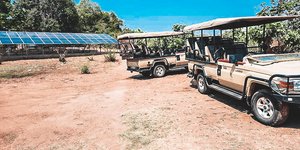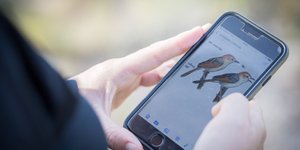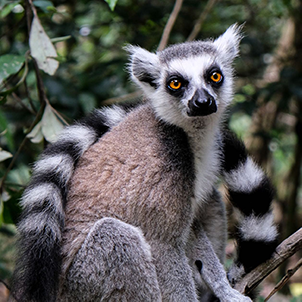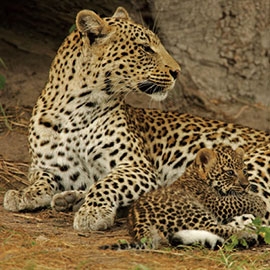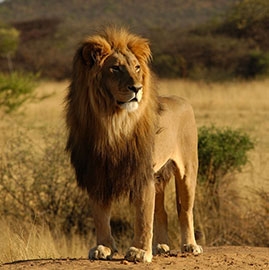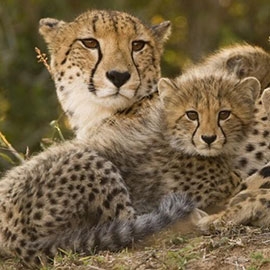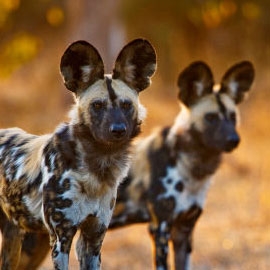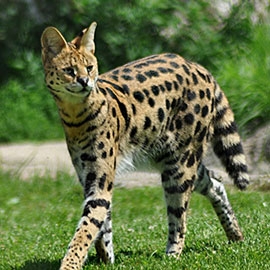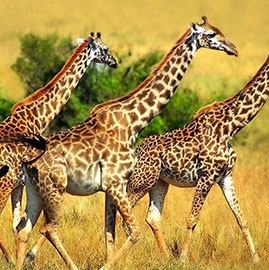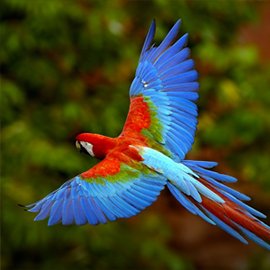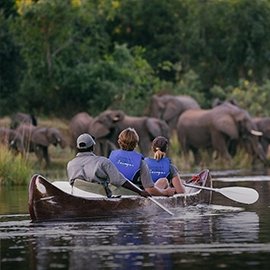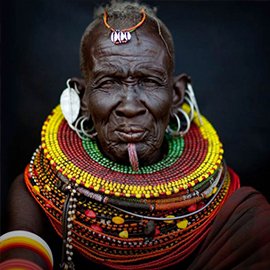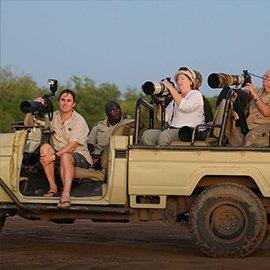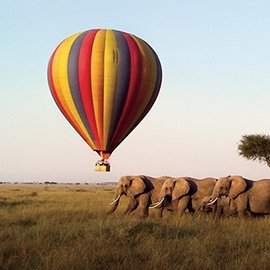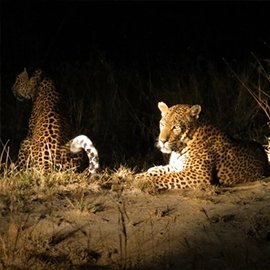Kafue National Park
Safari suitability: 8/10
Find your tourLarge park with diverse ecology, terrain and safari options. No rhinos.
What YAS members think
Highlights
- Among the largest national parks in the world
- Amazing birding adventures
- Rich forest and bush lands
- Four of the big five. Only the rhino is not present.
About Kafue National Park
Kafue National Park is the largest in Zambia covering over 22,000 km² (8,500 miles²). Bordered on the east by the Kafue River, it is one of the largest national parks in the world, twice the size of Yellowstone. While Livingstone International Airport is closer to the park’s southern region, Zambia’s capital of Lusaka is more accessible to its northern region. The long, narrow strip of reserve is home to over 150 native mammals and nearly 500 bird species. One of the highlights of Kafue is its cheetah population. The cheetah is not found in Lower Zambezi or Luangwa parks.
The few state roads traversing the park cover diverse terrain from plains to wooded forest. Guided safaris in Kafue originate from any one of the two dozen bush camps and lodges in the park’s north region and eastern borders. The southern camps are located near the shores of the Kafue River. Big game poaching is a problem throughout the region but is more noticeable in the south. Although efforts are in place to curb illegal hunting, safaris in the south are notoriously light for large animal watching. The Busanga Plains in the north are best for animal viewing.
When to visit Kafue National Park
Zambia has a rainy season from October to April. The dry season is both hot and cool, but never very cold nor extremely hot. Although the rainy season begins in October, until December it its often considered hot and dry. The rains come in after the new year. Camps and lodges are often full, especially during the dry season. Most are open year round, but nearly every camp and safari is located on a seasonal floodplain. The more predictable option is to plan a safari during the dry season, which is June through October.
Kafue NP - the biggest national park in Africa - is still a hidden gem. It's easily reached from Lusaka via the Mongu - Lusaka - Road or from Livingstone via Kalomo / Namwala. We just returned from the central part of the park. We stayed at Kasabushi Camp on the banks of the Kafue River. Very clean camp, easy to find and very friendly camp staff and owners. While out on game drive we spotted the usual game, like tsetse flies, impalas, pukus,... We followed a side track with not many highlights but when returning to the main road. Click, Click, Click. Leopard. Just on the road. Relaxed. A youngster. Moments later the female crossed the road. The 2 were posing for some time before strolling down to the river for a drink.
Sort by:

I went on a vacation with my colleagues, it was a 3 days vacation in the Kafue National Park, we were booked at one of the luxury safari tent facing the river. it was an experience of a life time, the verandah for our tent was facing the river and you will find mostly the crocs will come beside the Verandah to sunbathe and it amazing and scary at the same time to be that close to nature without being harmed. The park has very experienced guides to make you feel safe really we felt safe while lodging. the trip was marvelous and I would recommend those who haven't been to visit the park.
Leaving Livingstone in the early morning the road to Kalomo isn't fantastic but it is short. Once you leave Kalomo the road winds through the hills past Bilili Hot Springs and many, many little villages and past local schools - a great experience of local Zambian life and culture. At the Ndumdumwezi Gate there is the usual sing in and pay and for the first few kilometers the road was pretty good but it soon becomes more of a two track than anything else. There is the main Cordon Road, the Western Boundary Track and the little known shortcut that cuts directly North - don't use the latter! I did, all alone in my Landrover, and to say that it got "hairy" is an understatement!!! I nearly shat my pants a few times but eventually got through and to the camp I had booked with. the Cordon Road is cool, well used and easy to navigate - don't bother with a GPS, it'll just get you lost. Tracks 4 Africa is the only one to have with you. The Western Boundary Track is just that, a track and for the most park over grown, wild, majestic and absolutely incredible! You need to be a VERY experienced Africa traveller to use this road and have all the kit you could need on your vehicle. Game viewing was fantastic to say the least. Most people say the Southern Section of the park has no game, well, they have no brains or no eyes because the South is where its all happening...Lion, leopard, elephant, serval, buffalo, giraffe, zebra, egyptian vulture, black faced love birds ...... Brilliant to say the least! Mopane woodlands, raparian river edges, open savanna, sodic sites and much more so all sorts of habitats supporting a really diverse amount of game. I stopped the car to pee, opened the door with meter high grass on the side and stood in the open door....as I'm enjoying the relief I see a head pop up, then another, and another....you get the picture! A pride of lion not 20 meters from the open door. The sound of "water" woke them up. Nanzhila Plains is a beautiful lodge! Set on the side of a dambo there is a constant stream of animals to enjoy from your deck. North from Nanzhila the scenery is spectacular for around 100kms until you get to the Elephant Orphanage - you must go there as this takes you through the Ngoma Teak Forests and more fantastic sightings of antelope you will find nowhere else in Africa.
 South Africa
South Africa
Kafue National Park in Zambia is one of the more remote and wild-feeling Southern African safari destinations. At 9,000 square miles, its Zambias biggest and oldest park. Kafue hosts the highest diversity of ungulate species in Africa including many rare antelopes such as sitatunga, Lichtensteins hartebeest, defassa waterbuck, and yellow-backed duiker. The bird list, at nearly 500 species, will keep bird watchers endlessly entertained, while a variety of habitats spanning miombo woodlands, teak forests, grassy dambos, swamps, and riverine vegetation provide plenty of scenic beauty. Kafues diversity is truly something special, but visitors should not expect non-stop game viewing action. Much of Kafue is covered by low nutrient miombo woodlands, which means wildlife densities are relatively low. Kafues wildlife also tends toward the shy side. Safari goers interested in speeding between big five sightings might be disappointed here. But visitors who are after a wilderness experience with the occasional special sighting will be well rewarded in Kafue. A wilderness enjoyment mindset is also a positive asset when dealing with the annoying tsetse flies that are part of Kafues diversity. When a tsetse gives you a painful bite, try to remember that these flies are the reason this vast park is still wild and was never converted to land for livestock. Kafue covers a huge area, so most visitors will choose one or two sections to explore. In the south, grassy plains split up the monotony of the miombos. Some of our best sightings here were serval, elephants, roan antelope, and crowned cranes. The south is accessible with a good 4x4 for self-drivers from Livingstone. Self-drivers need to be experienced and well-prepared for any emergency. You can go days without encountering another vehicle. The central section around Hook Bridge features the highest density of lodges and tourist infrastructure, concentrated along the Kafue River. Still, you will encounter few other visitors. It is accessible from the tar road out of Lusaka. Here there is a good chance of finding lion, leopard, and elephant and plenty of birds in the riverine vegetation. Special ticks for us included African Finfoot and Half-collared Kingfisher. Its a days trip south along the newly opened Spinal Road to visit Lake Itezhi-Tezhi and the teak forests. The lake is home to hippos, and plenty of wildlife grazes along the banks. We saw cheetah here and large herds of elephant. The highlight of Kafue is Busanga Swamps in the far north, one of the most special landscapes in Africa. This section teams with water-loving wildlife like puku, lechwe, hippos, and water birds. The animal density here is higher than anywhere else in the park. Elephant and buffalo frequent the area, and you have a good chance of finding resident lion, leopard, and cheetah. The sunrises and scenery here are awe inspiring. Unfortunately, Busanga is only accessible to those staying in one of the areas three luxury lodges, which are only open July to September when the flood waters recede. But if you can afford it, Busanga is not to be missed. For a special treat, you can even explore the swamps in a hot air balloon. For wilderness lovers who know what to expect, Kafue is a dream.
 United States
United States
For a park that is only about a 5-6 hour drive away from a capital city, Kafue is wonderfully remote and isolated. It was great to have safari options here, too, such as walking, game drives and boating safaris. We would often do boating safaris in the evening so that we could also enjoy the sunset. I stayed at Musekese and was impressed with Phil, Tyronne and Alec. All were gracious and knowledgeable. Hope to return again.
Kafue National Park is the oldest and largest of Zambia's national parks and it still remains little-known and largely unexplored!! Kafue holds possibly the greatest diversity of wildlife of any national park in Africa, which makes this so exciting! Some animals you will see range from otters, water monitors, hippo, crocodiles, red lechwe and Cape buffalo. This is also an excellent fishing area for bream, pike and barbel and great for boating enthusiasts. Bird life here is prolific with Spur-winged geese, pelicans and flocks of open-billed storks, crowned cranes, saddle-billed storks and wattled cranes. The plains also have frequent sightings of lion, leopard and cheetah. The grassy plains in this area are often 'mowed' by hippos. You will also see that elephant, buffalo, zebra and wildebeest frequent the dam in this location.
THE KAFUE is home to possibly the greatest diversity of wildlife species of any African National Park. It's unique blend of environments that include Miombo (Brachystegia) woodland dotted with the remains of oxbow lagoons that provide lush grazing, permanent river systems and the jewel in her crown the vast open Busanga Plains. The Kafue is simply vast and with few safari camps the feeling of solitude and having the bush to your selves is complete. It is quiet possible to see more than 40 different mammals and over 150 bird species (there are 495 recorded) in just a week in the Kafue. With an especially high number of Antelope species (Sable , Roan, Lechwe, Reed buck, Deffassa Waterbuck to name just a few ) inhabiting all of the key eco systems there are also a high density of predators. Lions are a big feature of the Kafue as are Leopards but watch out for Serval, and African Wild Cat, Cheetah and may be even Caracal. Wild dogs are here and seen more often as seasons pass. As the recognized experts on the Kafue and Zambia as a whole we are able to suggest safari that will enable you to get the very best for a safari to the Kafue. Tyrone Mckeith Camp Owner, Hon Kafue Wildlife officer
The second largest park in Africa, Kafue National park gets its name from the Kafue River, which flows through it in the north. Poaching and neglect had left this park devoid of any wildlife just plain lush grassland, its been almost a decade since the Zambian Wildlife Authority took over and began a long and tedious process of restoration. I wanted to visit the area with the most game so I enquired before leaving the capital city of Zambia, Lusaka. "The Busanga Plains" in the northern part of kafue was the populous answer I got from the tour guides i met . There are three travelling options to get there, you can charter a plane and fly in, drive yourself into the park or arrange for a tour company to drive you in and around the park. I wanted an expedition but at the same time a relaxing holiday safari and so I opted the chartered plane option so as to avoid the tiresome and long journey by road. There are no scheduled flights, just on demand flights . We arrived at the busanga bush camp in the heart of the busanga plain , this was our camp before our anticipated game drive the following day. Rates in this camp and others around here cost on average minimum usd 700$ pppn. The camp offers a 180 degrees uninturrupted view of busanga's plain. We saw large number of birds from the African Goliath Heron, Ground Hornbill, African Fin Foot among others around our camp. By dawn we were awakened by an unforgettable, eyecatching sunrise while taking breakfast with plain views of antelope species like african sable, bushbuck and waterbucks grazing around us. We were informed that the park has an impressive 470 of Zambia's 733-recorded bird species. The game drive also cemented the parks game attraction credibility. We saw herds of elephant, a pride of lions, cheetah, buffalo, zebra and leopards. Most of the big five game and this was all in some hours drive. This park offers a lot and is not crowded with tourists. Fo all bush connoisseur's, Kafue does not disapoint .
The drive from Lusaka, Zambia to Kafue normally takes about five hours. Those with international flights arriving in the morning can normally plan to drive straight to Kafue and even and enjoy a late afternoon game drive.
The following airlines travel to Kafue National Park

Bush & Lake Aviation is a newly established charter company offering flights from its Lilongwe base to destinations in Malawi and the adjacent regions. We offer a small team of dedicated pilots, engineers, and management with many years of experience in the aviation business. We fly directly to your destination making your connections possible and saving you the unnecessary frustrations of transfers - queues and delays Bush & Lake Aviation specializes in charters for leisure travel or business. Visit website
Also flies to:



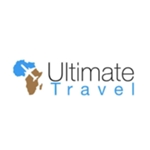
Ultimate travel is a fully Malawian owned Tour Operator and Travel Service Company. We are an innovative, reliable and independent ground-handling company that specializes in Malawi and Zambia (South Luangwa). No one has a better all-round knowledge of the Malawian tourism product and how to pull it all together than us. We do not handle the request with a one size fits all attitude but rather tailor make our services to meet what you need. Our independence means that we are happy to book any lodging facilities throughout Malawi; alternatively, we are always pleased to recommend what we believe to be the best itinerary to suit your criteria. Visit website
Also flies to:



Wilderness Air is proud to be the air partner of Wilderness Safaris, a responsible ecotourism and conservation company with private access to the finest wilderness and wildlife areas of southern Africa. Wilderness Air began operating in 1991, with one aircraft based in Botswana servicing two camps in the Okavango Delta. Today, Wilderness Air is also based in Namibia, Zambia and Zimbabwe, operating over 35 aircraft and employing over 50 pilots. Throughout its time, it has maintained its excellent reputation for safety and guest service. We operate a varied fleet of light aircraft, chosen for their ability to transport visitors comfortably to remote wilderness destinations with dirt airstrips. Each aircraft type has been selected based on its ability to transport different numbers of passengers, over different ranges. Our fleet operates on a daily circuit within the regions. Wilderness Air is privileged to fly into some of the most pristine wilderness areas in the world. We believe that flying is an integral part of each guest's travel experience and that our pilots' passion and professionalism can make a genuine contribution to journeys that change lives. Visit website
Also flies to:




Kafue map
Related articles
Latest photos



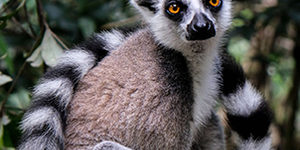
 United Kingdom
United Kingdom
 Kenya
Kenya
